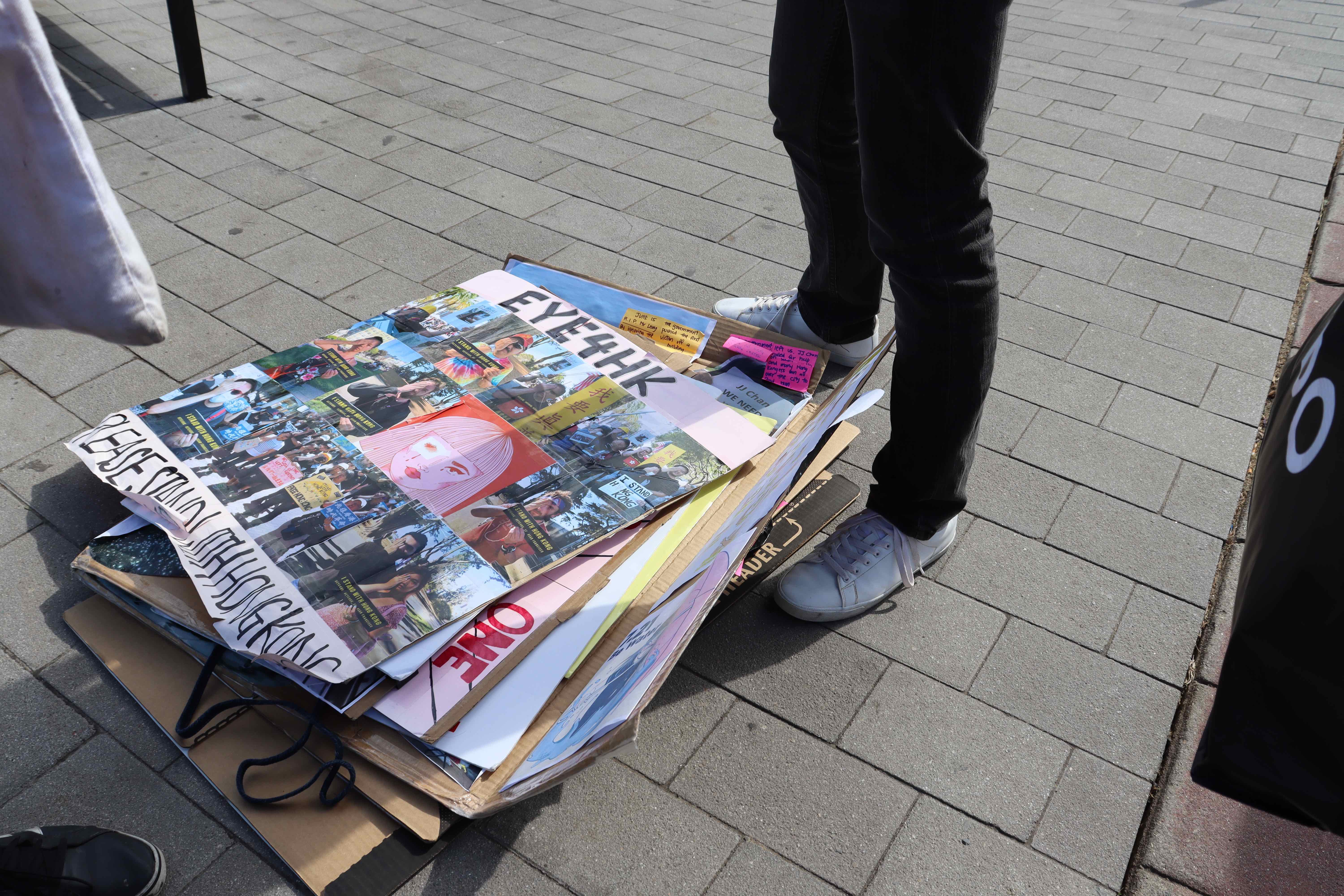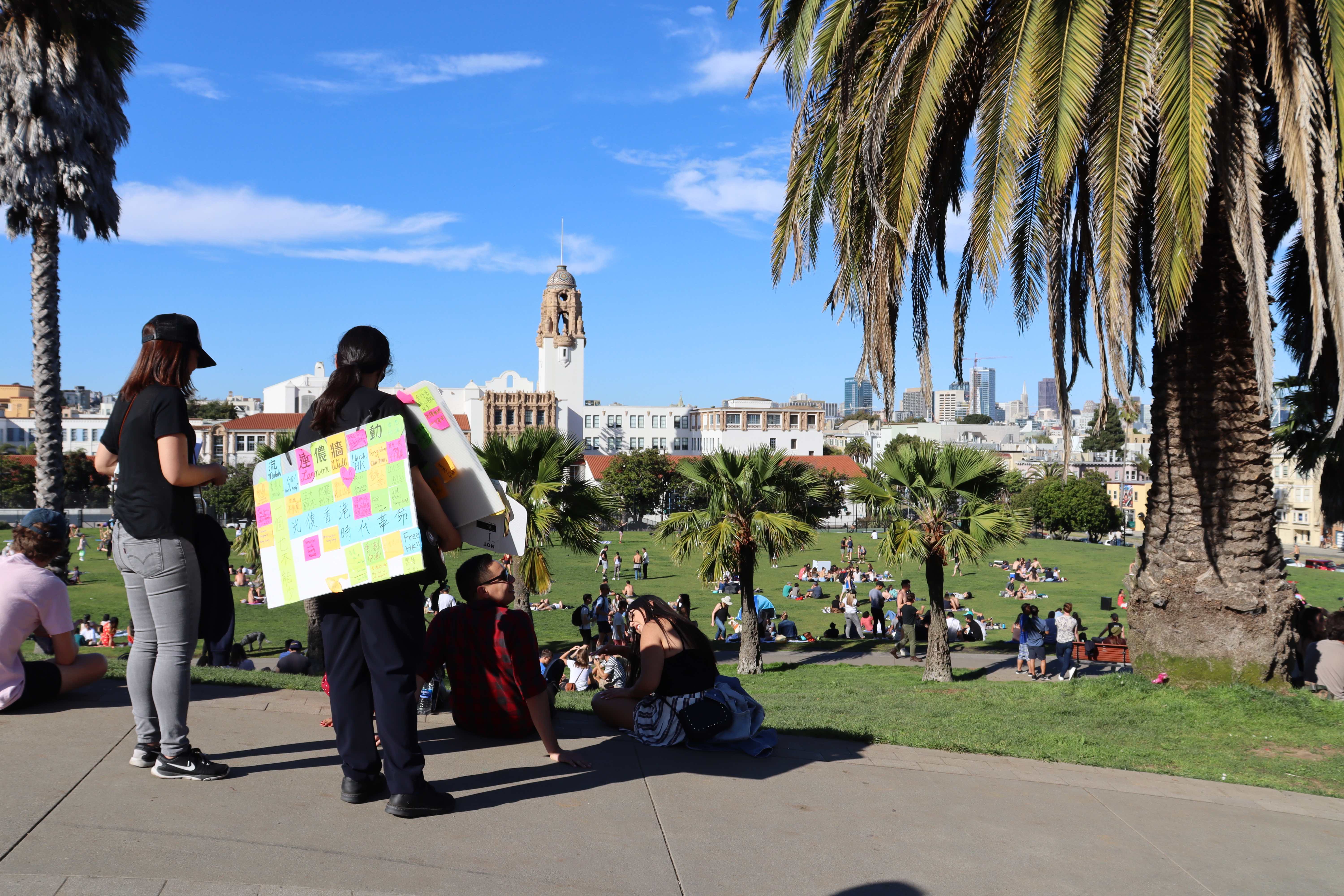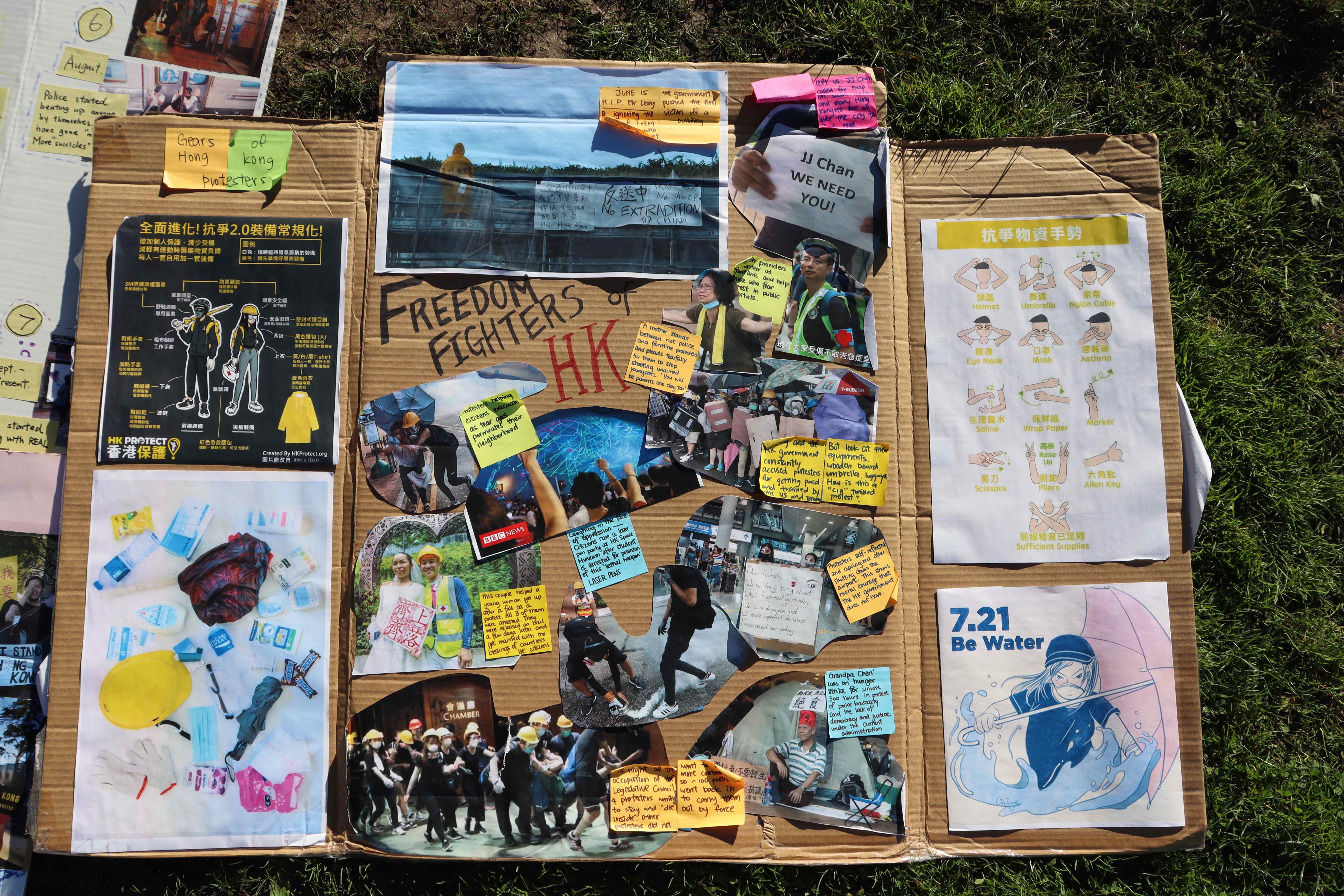
They descended on Dolores Park like a swarm of punk rockers. Black pants, black masks, and T-shirts that read, “There are no rioters, there’s only tyranny.”
They donned yellow helmets. Sunglasses to hide their identities. Then walked into the Sunday afternoon crowd to collect signatures.
As violence escalates between protesters and police on the island of Hong Kong, pro-democracy activity in San Francisco was decidedly more peaceful. On a clear weekend in early October, a pro-Hong Kong democracy group calling itself “Conversations with the Courageous” canvassed for support in Dolores Park. Comprised primarily of Hong Kong expatriates, the group is part of a constellation of Chinese pro-democracy organizations in the Bay Area that have either emerged or been reinvigorated in the wake of this summer’s unrest.
Yet even as pro-democracy organizations flourish in the densely Chinese Northern California area, the protests in Hong Kong are taking on a darker edge, with several protesters shot and thousands arrested. The result is a renewed sense of urgency among the movement’s overseas participants, who express feelings of powerlessness and “survivor’s guilt.” One group even said it anticipated supporting political refugees from Hong Kong, if or when the movement falters. The desperation marks a phase familiar to other pro-democracy groups who have taken on China’s authoritarian regime: continuing the struggle from overseas.
Elena (who, like other protesters, declined to provide a last name for fear of government retribution) founded “Conversations with the Courageous” after returning from Hong Kong this summer. Having witnessed the protests firsthand, she felt an obligation to contribute to the movement from abroad.
The small island territory of Hong Kong is formally owned by China but until recently has enjoyed a high degree of independence. After the pro-Beijing government proposed extradition legislation that would have tied the territory closer to the mainland, citizens took to the streets in protest. Though the legislation has since been aborted, the protests have grown more violent, with protesters hurling petrol bombs and police firing live rounds.
“There are a lot of us who are risking their lives on the front line,” said Elena, referring to the protesters doing battle on the streets. Overseas supporters “can’t ever do enough to make up for that.”

Elena’s organization held its first meeting on August 25. Since then, its several dozen volunteers have joined or organized several pro-democracy events across the Bay Area, including a letter-writing activity in Berkeley and a rally at the Civic Center Plaza in San Francisco.
California is home to over 30% of the Chinese-born population in the U.S., a figure that includes those born in Hong Kong. The total Hong Kong-born population in the U.S. was 233,000 in 2015, according to census data.
Northern California in particular has been a hotbed of pro-Hong Kong democracy activity this summer, with new organizations emerging that include the Hong Kong Affairs Association of Berkeley and the Bauhinia Project, a sleek online publication named for an orchid that appears on the Hong Kong flag.
Each has carved its own niche. The Bauhinia Project bills itself as “People’s Poetry of Hong Kong” and aims to “connect the soul of an isolated Cantonese-speaking people to the soul of the world.” It boasts an online interface featuring translated poems submitted from Hong Kong alongside pictures from galleries it has sponsored worldwide.
“The Bauhinia Project can’t resist by fighting in Hong Kong,” said the group’s anonymous founder, contacted via email on the website’s homepage, “but we can resist by building something outside Hong Kong.”
New organizations have also paired up with long-running mainland pro-democracy groups, such as Humanitarian China, a San Francisco-based organization that promotes human rights and the rule of law in China. The organization claims to have raised $20,000 for the Hong Kong protests as of October.
Zhou Fengsuo, president of Humanitarian China and a former student leader in Tiananmen in 1989, sees echoes of his own youth in today’s protesters. He calls the movement the “reincarnation of the love of freedom.” But he also feels to some extent personally responsible for their current struggle.
“This situation is because of a change that should have — but didn’t — happen thirty years ago in China,” he said in an interview, referring to the quashed Tiananmen pro-democracy protests. “This is our unfinished job.”
Zhou said Humanitarian China was prepared to provide temporary housing to political refugees from Hong Kong, should it be necessary. He noted that thousands have been arrested, and many more are “living in fear.”
Ken Chan, a core member of the Northern California Hong Kong Club, an advocacy group dedicated to promotion of democracy development and human rights in China and Hong Kong, says “no one knows” what will happen to the protest movement, but also doesn’t think the Hong Kong government will use force.
“We can only react to whatever happens,” Chan said. “I don’t see a way out. Everyone’s worried.”
In Dolores Park, Elena and other members from Conversations with the Courageous made limited progress in getting locals to sign letters to their elected representatives advocating for the passage of pro-Hong Kong democracy legislation currently under review in the U.S. Congress, nicknamed the “Hong Kong Human Rights and Democracy Act of 2019.”
The proposed legislation would require the Department of State to report annually to Congress as to whether Hong Kong is “sufficiently autonomous from China to justify its unique treatment.”
The bill sailed through the U.S. House on Oct. 16, and is headed for almost certain passage by the Senate in the coming weeks.
While U.S. President Donald Trump has kept relatively quiet on the Hong Kong protests, possibly to avoid jeopardizing ongoing trade talks, Congressmen have been more vocal in their support of the protesters.
But that wasn’t enough for Catherine (who also declined to provide her last name), a co-organizer of Conversations with the Courageous. She wanted more signed letters.

There can’t be any “no” votes, she said. Unanimity is important. “That 99 percent has to be 100%.”
By late afternoon, the group had collected 68 signed letters addressed to elected representatives, plus verbal commitments from others to support the movement online. Several protesters crowded around a young female protester and her guitar. She played the movement’s protest anthem, “Do You Hear the People Sing?” from Les Misérables.
A bearded man walked by selling psychedelic mushrooms from a box slung over his chest. The protesters ignored him.
“I play guitar to express my emotions when I’m down,” said the guitarist, before quickly adding that she was also raising awareness for the movement.
A pile of poster boards documenting Hong Kong police brutality lay beside her, while a stream of park-goers passed her by.
Before long, the music started up again. The protesters began to sing.
